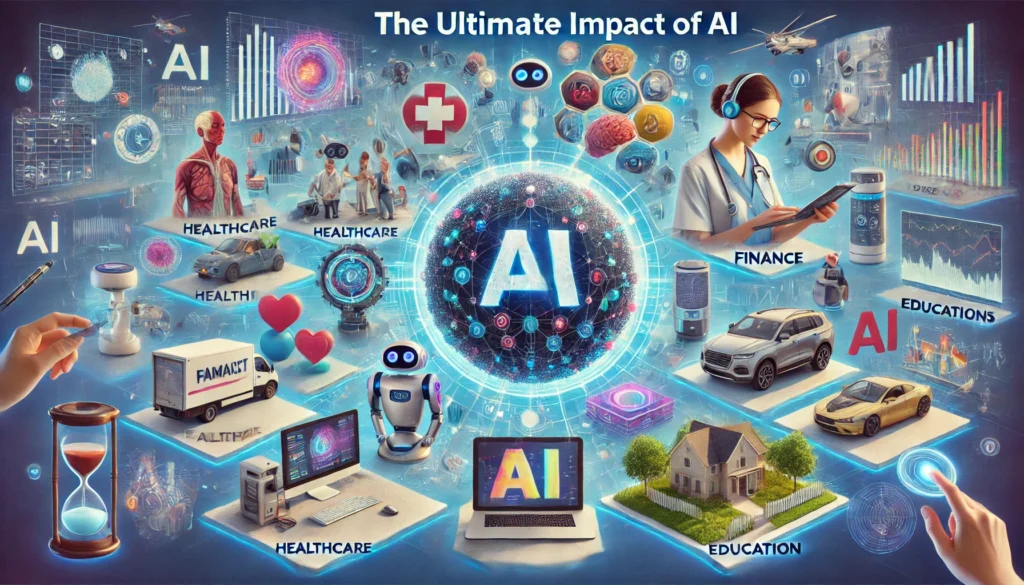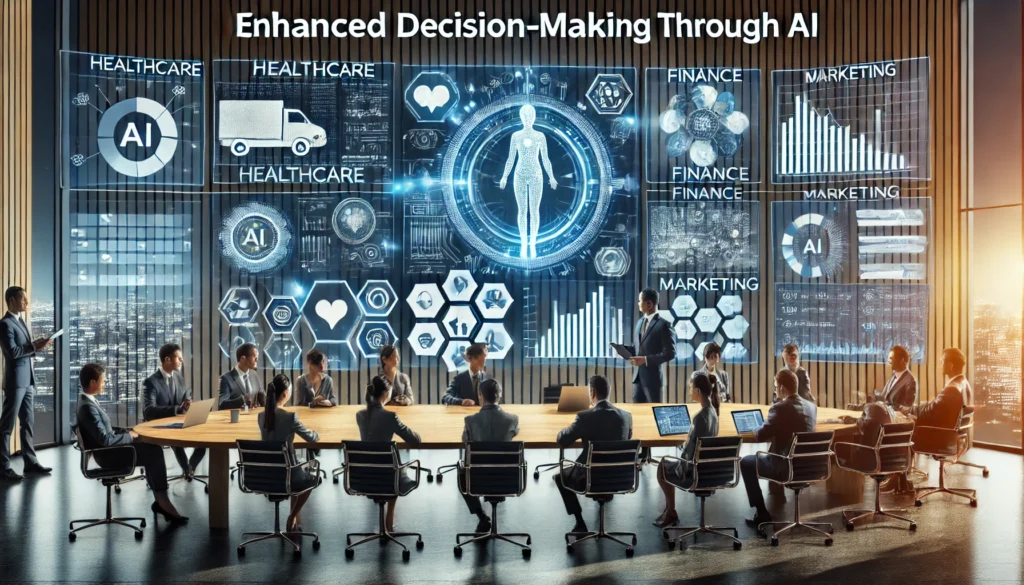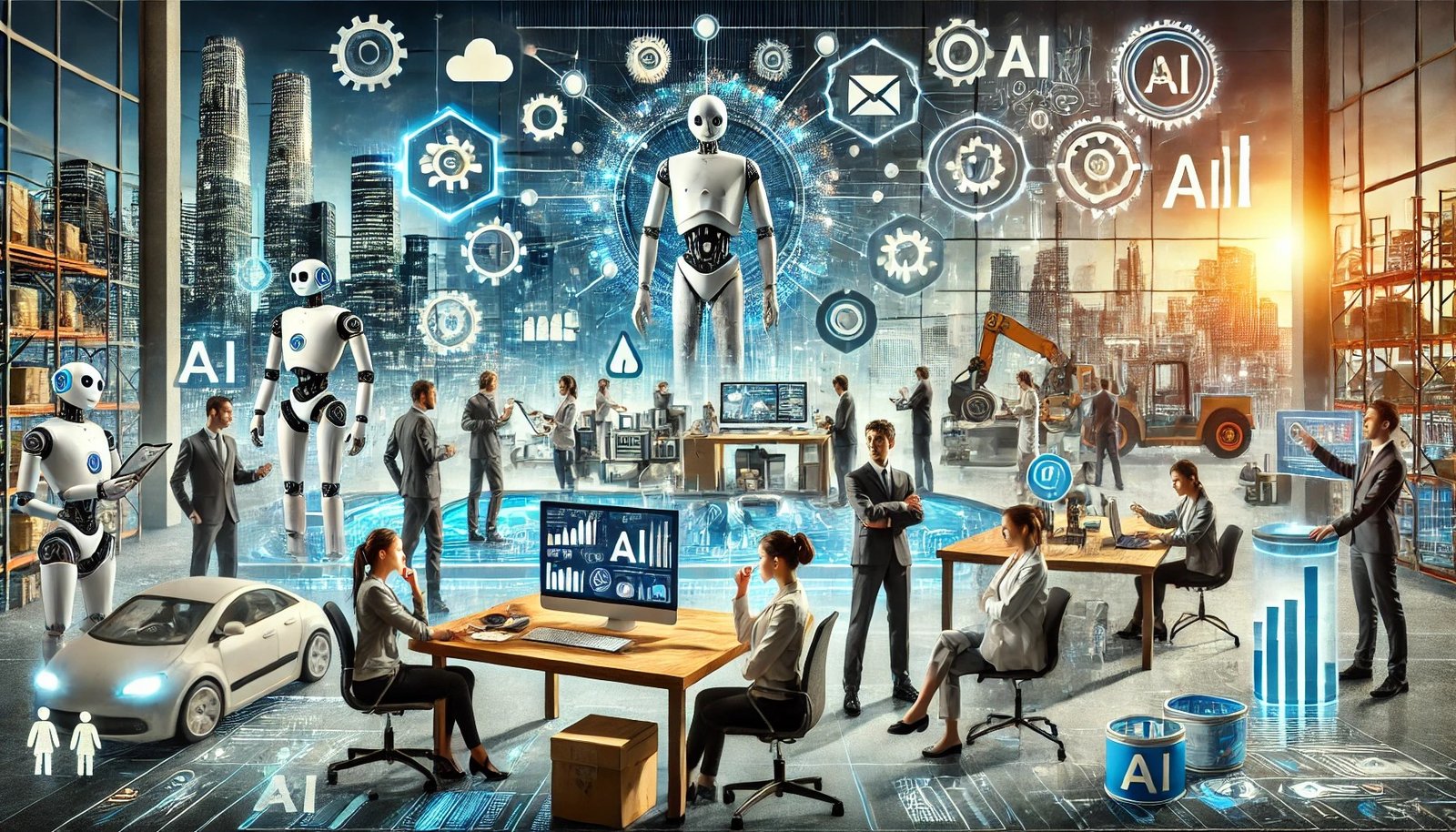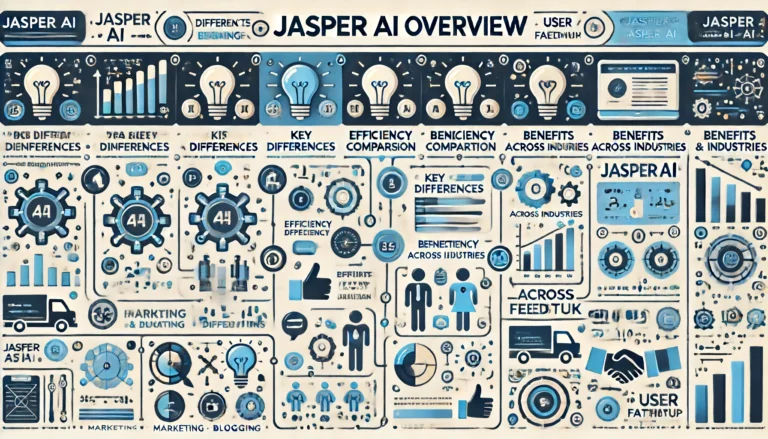The Ultimate Impact of AI on Business Competitiveness 2024 https://www.talentneuron.com/
Table of Contents
The Ultimate Impact of AI on Business Competitiveness 2024
In today’s rapidly advancing technological landscape, artificial intelligence (AI) has become a cornerstone for maintaining competitiveness across various industries. More than half of the companies surveyed in the 2021 McKinsey Global Survey have adopted AI in at least one business function, signaling a significant shift towards digital transformation. This adoption is not just about keeping pace with technological trends; it’s about leveraging AI to enhance business operations and strategic decision-making.
AI technologies are being implemented across a spectrum of business activities, from automating customer service interactions to optimizing supply chain logistics and enhancing research and development. These tools are not only improving efficiency but are also providing businesses with critical insights that drive smarter, faster business decisions. For instance, AI-powered analytics can predict consumer behavior patterns, enabling companies to tailor their strategies proactively.
Moreover, the integration of AI is proving to be a key differentiator in terms of market competitiveness. Companies that are early adopters of AI technologies often find themselves ahead of the curve, benefiting from first-mover advantages in innovation and customer engagement. As AI continues to evolve, its role in shaping competitive strategies becomes increasingly evident, making it essential for companies to continuously assess and integrate relevant AI technologies into their operations.
This strategic adoption of AI not only prepares businesses for the future but also sets a foundation for sustained growth and success in a digital-first economy. As we look forward, the trajectory of AI integration is poised to expand even further, underscoring the importance of staying current with AI advancements to remain competitive in the ever-evolving market landscape.
Staying Ahead in AI: How Businesses Are Harnessing the Power of Artificial Intelligence
Introduction
In today’s fast-paced digital landscape, artificial intelligence (AI) is more than just a buzzword—it’s a fundamental component of business strategy. From small startups to multinational corporations, the integration of AI technologies is rapidly transforming industries by enhancing efficiency, innovation, and competitiveness. As AI continues to evolve, staying abreast of the latest advancements is not just advantageous; it’s imperative for businesses aiming to maintain a competitive edge in an increasingly automated world.
Current Trends in AI Adoption
The landscape of business technology is witnessing a seismic shift, largely driven by the rapid adoption of artificial intelligence (AI). According to the 2021 McKinsey Global Survey, over half of the companies surveyed have already integrated AI into at least one business function. This trend is not just about keeping up with technology but about staying ahead in a fiercely competitive market.
Industries such as healthcare, automotive, and customer service are leading the charge, leveraging AI to transform their operations. In healthcare, AI is revolutionizing patient care with predictive analytics and personalized medicine. The automotive sector utilizes AI for everything from autonomous driving features to supply chain management improvements. Meanwhile, customer service departments across various industries are employing AI-powered chatbots and voice assistants to enhance customer interactions and satisfaction.
This widespread integration of AI across diverse sectors underscores a critical point: businesses are not just using AI as an optional tool but as a fundamental component to innovate and thrive in today’s digital economy.

The Impact of AI on Business Competitiveness
In today’s rapidly evolving market, over 50% of companies have turned to artificial intelligence (AI) to not just streamline operations but significantly boost their competitive edge. This strategic adoption, highlighted in the 2021 McKinsey Global Survey, underscores a pivotal shift in how businesses leverage technology to enhance their market position.
AI technologies are being implemented across a spectrum of business functions, from automating customer service interactions to optimizing supply chain logistics and enhancing decision-making processes. These tools are not just about replacing old systems but are crucial in providing businesses with the analytical capabilities necessary to predict market trends and customer needs more accurately.
For instance, in the retail sector, AI-powered predictive analytics are used to tailor product recommendations to individual consumer behaviors, thereby increasing sales and customer satisfaction. Similarly, in manufacturing, AI-driven robots and IoT (Internet of Things) devices streamline production lines and reduce downtime, leading to higher productivity and reduced operational costs.
The adoption of AI not only reflects a technological upgrade but a transformative move towards data-driven business models that are agile, smarter, and more attuned to the dynamic market demands. This shift is not merely a trend but a fundamental change in how companies operate and compete in the digital age.
Growth and Projections of AI Technologies
The landscape of artificial intelligence in business has transformed dramatically, experiencing a staggering 270% growth over the last five years, according to a McKinsey Global Survey. This surge underscores an era where AI is no longer just an experimental venture but a fundamental component of business strategy. Industries across the board, from automotive to healthcare, are not just adopting but integrating AI at a core operational level to drive efficiencies and innovation.
Looking ahead, the prospects of AI are even more promising. A report from PwC forecasts that AI could contribute up to $15.7 trillion to the global economy by 2030. This projection is not just a number—it’s a reflection of the potential AI holds in revolutionizing industries by enhancing productivity and spearheading new technological advancements. The financial implication here translates to a significant competitive advantage for businesses that are early adopters and continuous innovators in AI technology.
As businesses continue to navigate the complexities of digital transformation, staying abreast of these trends is not just beneficial; it’s imperative for survival in an increasingly AI-driven world. The future landscape of AI is one of expansive growth, with its integration becoming a pivotal marker of business success and competitiveness on a global scale.
AI and Job Creation
As artificial intelligence reshapes industries, it’s also redefining the job market. According to the World Economic Forum’s 2020 report, AI is set to create approximately 97 million new roles by 2025. These roles reflect a new division of labor, where human skills are complemented by machine efficiency. While AI displaces some jobs, it also creates new opportunities in sectors like AI maintenance, decision analytics, and system development.
The shift isn’t just about numbers; it’s about the nature of work itself. Traditional roles are evolving, requiring new skills that harmonize with AI technologies. For instance, customer service representatives now leverage AI tools to provide personalized solutions. Similarly, in healthcare, AI assists with patient management systems, requiring healthcare professionals to adapt to these technological aids.
This dynamic change underscores the importance of continuous learning and adaptability in the workforce. As AI continues to advance, the ability to integrate new technologies with existing roles will be crucial. For businesses, this means investing in training and development, ensuring employees are equipped to meet the demands of an AI-enhanced workplace.
Looking ahead, the challenge for employers will be to balance automation with human skills, fostering a workplace where both can thrive. This transformation, while daunting, is also filled with opportunities for those ready to embrace the new landscape of work shaped by artificial intelligence.

Enhanced Decision-Making Through AI
In today’s fast-paced business environment, leveraging artificial intelligence (AI) for enhanced decision-making is not just an advantage; it’s becoming a necessity. According to a recent survey, approximately 72% of business leaders acknowledge that AI significantly boosts their company’s decision-making capabilities. This statistic underscores the pivotal role AI plays in analyzing complex data sets and providing actionable insights that drive smarter, quicker business decisions.
AI tools are now integral to various strategic areas such as market analysis, customer behavior predictions, and operational efficiencies. For instance, AI-powered analytics platforms can sift through massive amounts of data to identify trends that humans might overlook. These capabilities allow businesses to anticipate market changes and respond proactively, rather than reactively.
Moreover, the integration of AI in decision-making processes not only enhances accuracy but also speeds up the time it takes to derive valuable insights. This rapid processing leads to more agile business practices and can significantly improve a company’s competitive edge in the market.
As businesses continue to navigate a data-driven world, the reliance on AI for decision-making is expected to grow. This trend points towards a future where AI is not just a tool for operational efficiency but a foundational element in crafting business strategy and driving innovation.
The Future of AI
As we look toward the next decade, the trajectory of artificial intelligence suggests a landscape ripe with innovation and transformative potential. The rapid advancement of AI technologies is poised to redefine industries, from automated driving systems in the automotive sector to advanced diagnostic tools in healthcare. However, navigating this future will not be without its challenges.
One of the most significant hurdles will be ensuring ethical standards and regulatory compliance as AI becomes more autonomous. The integration of AI in sensitive areas such as data privacy, surveillance, and decision-making processes will require robust frameworks to prevent misuse and protect civil liberties. Transparency in AI operations and decision-making processes will be crucial to building trust and acceptance among users.
On the opportunity front, AI is expected to drive unprecedented efficiency and productivity. Industries that harness AI for predictive analytics, personalized services, and supply chain management are likely to see substantial growth and resilience against market disruptions. For instance, AI’s ability to analyze large datasets rapidly can help companies anticipate market trends and customer needs, offering a considerable competitive edge.
Moreover, the collaborative potential between humans and AI is set to unlock new creative and strategic horizons. The augmentation of human capabilities with AI tools can lead to innovative solutions to complex problems, fostering a new era of creativity and ingenuity in the workplace.
In conclusion, while the path forward may be fraught with challenges, the opportunities presented by AI are immense. Businesses that stay informed and adaptable, embracing both the technological advancements and the ethical considerations, will be well-positioned to thrive in this new era of digital transformation. As we continue to explore the vast potential of AI, it remains imperative for stakeholders to foster an environment of learning, adaptation, and proactive governance to fully realize AI’s benefits while mitigating its risks.

The Unique Impact of AI on Business Competitiveness
Artificial Intelligence (AI) is uniquely transforming the competitive landscape of businesses across various industries. By automating routine tasks, AI allows companies to optimize operations, reduce costs, and increase efficiency. This technology not only improves internal processes but also enhances decision-making through advanced data analytics. Businesses can leverage AI to gain deeper insights into market trends, customer behaviors, and operational inefficiencies, enabling them to make more informed and strategic decisions.
One of the most distinctive impacts of AI is its ability to personalize customer experiences at scale. AI-driven tools can analyze vast amounts of data to understand individual customer preferences and behaviors, allowing businesses to tailor their products, services, and marketing efforts accordingly. This level of personalization fosters customer loyalty and drives higher engagement, setting companies apart from their competitors.
Moreover, AI enhances innovation by enabling rapid prototyping and testing of new ideas. Through machine learning algorithms, businesses can predict the outcomes of different strategies and optimize them in real-time, significantly speeding up the innovation cycle. This agility allows companies to stay ahead of market trends and respond swiftly to changes in consumer demand.
AI also plays a crucial role in improving product quality and safety. By integrating AI into production processes, businesses can achieve higher precision and reduce the likelihood of errors. Predictive maintenance powered by AI can foresee equipment failures before they occur, minimizing downtime and extending the lifespan of machinery, which is particularly beneficial in manufacturing industries.
Furthermore, AI fosters a more inclusive and diverse work environment. AI-powered recruitment tools can help eliminate biases in hiring processes by focusing on candidates’ skills and qualifications rather than subjective criteria. This leads to a more diverse workforce, which can drive creativity and innovation within the company.
Another unique aspect of AI’s impact on business competitiveness is its role in enhancing cybersecurity. AI can identify and respond to threats more quickly and accurately than traditional methods, protecting businesses from increasingly sophisticated cyber-attacks. This proactive approach to security not only safeguards company assets but also builds trust with customers and partners.
In conclusion, the unique impact of AI on business competitiveness is multifaceted, encompassing operational efficiency, personalized customer experiences, rapid innovation, product quality, workforce diversity, and enhanced cybersecurity. Companies that effectively harness AI’s potential can gain a significant competitive edge, positioning themselves as leaders in their respective industries. As AI technology continues to evolve, its influence on business competitiveness will only grow, making it an essential component of modern business strategy.
Conclusion
As we have explored throughout this article, the integration of artificial intelligence (AI) into business processes represents far more than a fleeting trend; it signifies a fundamental shift in how industries operate and compete. The rapid advancement of AI technology is reshaping the competitive landscape, making it imperative for companies to stay abreast of these developments to maintain and enhance their competitive edge in an increasingly tech-driven market.
AI’s ability to automate mundane and repetitive tasks is transforming operational efficiency. By offloading routine tasks to AI systems, businesses can significantly reduce costs and free up human resources for more strategic, value-added activities. This automation not only increases productivity but also minimizes errors, ensuring more reliable and consistent outcomes. For example, AI-driven automation in manufacturing can streamline production lines, enhance quality control, and reduce waste, leading to more efficient and cost-effective operations.
Beyond operational efficiency, AI is revolutionizing decision-making processes. Advanced data analytics and machine learning algorithms enable businesses to analyze vast amounts of data quickly and accurately. This capability provides deeper insights into market trends, consumer behaviors, and internal performance metrics. With AI, companies can make more informed and timely decisions, optimize strategies in real-time, and anticipate market shifts with greater accuracy. This enhanced decision-making capability is crucial for developing proactive business strategies and gaining a competitive advantage.
Furthermore, AI is opening up new avenues for innovation and job creation. By facilitating rapid prototyping and testing, AI allows companies to innovate faster and more effectively. Businesses can explore new ideas, products, and services with reduced risk and lower costs, accelerating the pace of innovation. Additionally, the rise of AI is creating new job opportunities, particularly in fields such as AI development, data science, and machine learning engineering. These roles are essential for designing, implementing, and maintaining AI systems, driving economic growth and fostering a skilled workforce.
The personalization capabilities of AI are also transforming customer engagement and satisfaction. AI-driven tools can analyze individual customer data to deliver highly personalized experiences, from tailored marketing messages to customized product recommendations. This level of personalization enhances customer loyalty and engagement, setting businesses apart in a crowded market. Companies that leverage AI to personalize customer interactions can build stronger relationships and improve customer retention rates.
Moreover, AI is enhancing the overall competitiveness of businesses by fostering a more inclusive and diverse work environment. AI-powered recruitment tools help eliminate biases in the hiring process by focusing on candidates’ skills and qualifications rather than subjective criteria. This leads to a more diverse workforce, which can drive creativity and innovation within the company. A diverse team brings different perspectives and ideas, contributing to more innovative solutions and better business outcomes.
Lastly, AI is playing a critical role in enhancing cybersecurity, an increasingly important aspect of business competitiveness. AI systems can detect and respond to cyber threats more quickly and accurately than traditional methods, providing robust protection against cyber-attacks. This proactive approach to security not only safeguards company assets but also builds trust with customers and partners, reinforcing the company’s reputation and reliability.
In conclusion, the integration of AI into business processes is driving a profound transformation across industries. From automating routine tasks and enhancing decision-making to fostering innovation and improving cybersecurity, the benefits of AI are vast and multifaceted. Staying current with AI advancements is crucial for businesses aiming to thrive in a tech-driven marketplace. By embracing AI, companies can unlock new opportunities, drive growth, and maintain a competitive edge in an ever-evolving digital landscape.
Next Blog How to Identify the Best Content Trends 2024 – Rank Rise Tech





Pingback: Ultimate Capcut Review 2024, Transform your videos like a PRO - Rank Rise Tech
Pingback: The Ultimate GoHighLevel Software 2024 - Rank Rise Tech